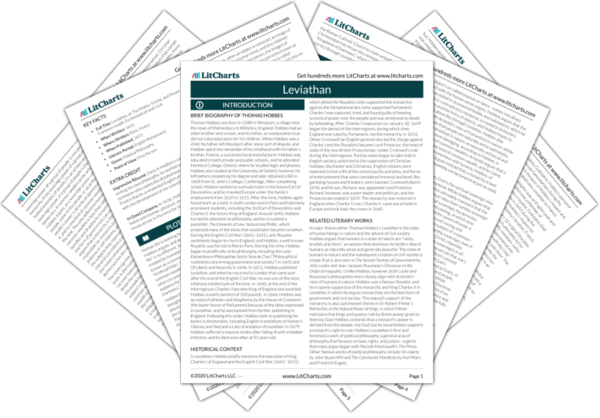Covenant Quotes in Leviathan
To describe the Nature of the Artificiall man, I will consider
First, the Matter thereof, and the Artificer; both
which is Man.
Secondly, How, and by what Covenants it is
made; what are the Rights and just Power or
Authority of a Soveraigne; and what it is that
preserveth and dissolveth it.
Thirdly, what is a Christian Common-wealth.
Lastly, what is the Kingdome of Darkness.

Unlock explanations and citation info for this and every other Leviathan quote.
Plus so much more...
Get LitCharts A+But where God himselfe, by supernaturall Revelation, planted Religion; there he also made to himself a peculiar Kindgome; and gave Lawes, not only of behavior towards himself; but also towards one another; and thereby in the Kingdome of God, the Policy, and lawes Civill, are a part of Religion; and therefore the distinction of Temporall, and Spirituall Domination, hath there no place. It is true, that God is King of all the Earth; Yet may he be King of a peculiar, and chosen Nation.
For who is there that does not see, to whose benefit it conduceth, to have it believed, that a King hath not his Authority from Christ, unlesse a Bishop crown him? That a King, if he be a Priest, cannot Marry? That whether a Prince be born in lawfull Marriage, or not, must be judged by Authority from Rome? That Subjects may be freed from their Alleageance, if by the Court of Rome, the King be judged a Heretique? That a King (as Chilperique of France) may be deposed by a Pope (as Pope Zachary,) for no cause; and his Kingdome given to one of his Subjects?
Hereby it is manifest, that during the time men live without a common Power to keep them all in awe, they are in that condition which is called Warre; and such a warre, as is of every man, against every man. For Warre, consisteth not in Battel lonely, or the act of fighting; but in a tract of time, wherein the Will to contend by Battell is sufficiently known: […] All other time is peace.
The Right of Nature, which Writers commonly call Jus Naturale, is the Liberty each man hath, to use his own power, as he will himselfe, for the preservation of his own Nature; that is to say, of his own Life; and consequently, of doing any thing, which in his own Judgement, and Reason, hee shall conceive to be the aptest means thereunto.
Men are freed of their Covenants two ways; by Performing; or by being Forgiven. For Performance, is the naturall end of obligation; and Forgivenesse, the restitution of liberty; as being a retransferring of that Right, in which the obligation consisted.
And in this law of Nature, consisteth the Fountain and Originall of JUSTICE. For where no Covenant hath proceeded, there hath no Right been transferred, and every man has right to every thing; and consequently, no action can be Unjust. But when a Covenant is made, then to break it is Unjust: and the definition of INJUSTICE, is no other than the not Performance of Covenant. And whatsoever is not Unjust, is Just.
Fifthly, and consequently to that which was sayd last, no man that hath Soveraigne power can justly be put to death, or otherwise in any manner by his Subjects punished. For seeing every Subject is Author of the actions of his Soveraigne; he punisheth another, for the actions committed by himselfe.
Of which, this is one, That a man to obtain a Kingdome, is sometimes content with lesse Power, that to the Peace, and defence of the Common-wealth is necessarily required.
To the contrary, I find the Kingdome of God, to signifie in most places of Scripture, a Kingdome properly so named, constituted by the Votes of the People of Israel in peculiar manner; wherein they chose God for their King by Covenant made with him, upon Gods promising them the possession of the land of Canaan; and but seldom metaphorically; and then it is taken for Dominion over sinne; (and only in the New Testament;) because such a Dominion as that, every Subject shall have in the Kingdome of God, and without prejudice to the Soveraign.












